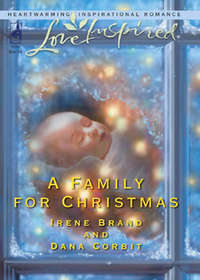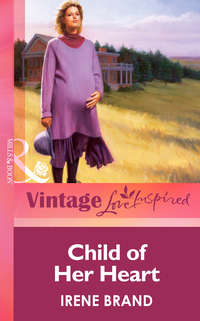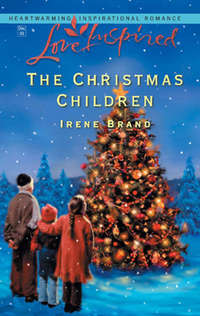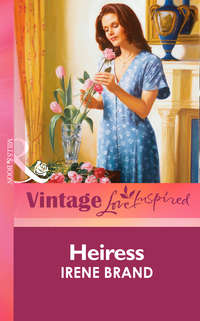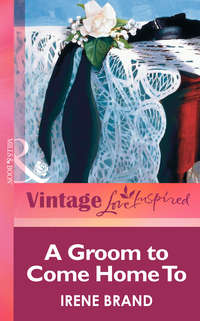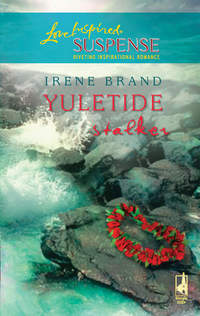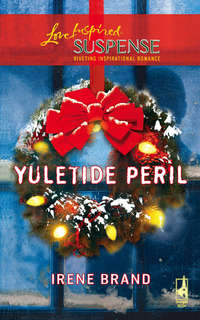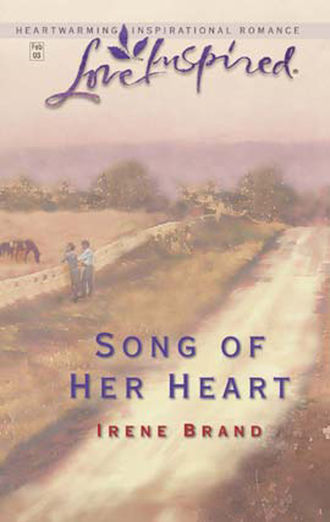
Полная версия
Song of Her Heart

Mason had envisioned Norah as a woman in her sixties who would provide a grandmotherly model for the children in the therapeutic program.
But Norah wasn’t grandmotherly. He could hardly believe she was forty-two. Her straight, silvery-gray hair was arranged over her forehead in a wispy mist, then flowed in soft layers to the base of her neck. Her bright, clear blue eyes were highlighted by long black lashes that contrasted with her ivory skin.
Mason had been lonely since his father’s death, but he hadn’t understood how lonely until Norah had entered his home. Yearnings that Mason thought he’d stifled forever suddenly seemed important again….
IRENE BRAND
Writing has been a lifelong interest of this author, who says that she started her first novel when she was eleven years old and hasn’t finished it yet. However, since 1984, she’s published twenty-four contemporary and historical novels and three nonfiction titles with publishers such as Zondervan, Thomas Nelson, Barbour, Kregel and Steeple Hill. She started writing professionally in 1977, after she completed her master’s degree in history at Marshall University. Irene taught in secondary public schools for twenty-three years, but retired in 1989 to devote herself to writing.
Consistent involvement in the activities of her local church has been a source of inspiration for Irene’s work. Traveling with her husband, Rod, to forty-nine of the United States, Hawaii excepted, and to thirty-two foreign countries has also inspired her writing. Irene is grateful to the many readers who have written to say that her inspiring stories and compelling portrayals of characters with strong faith have made a positive impression on their lives. You can write to her at P.O. Box 2770, Southside, WV 25187 or visit her Web site at www.irenebrand.com.
Song of Her Heart
Irene Brand

www.millsandboon.co.uk
I call to remembrance my song in the night:
I commune with mine own heart:
and my spirit made diligent search.
—Psalms 77:6
Thanks to Myra Johnson for sharing information
about her work with SIRE,
Houston’s Therapeutic Equestrian Center.
And to Charles and Elaine Rawson for sharing
expertise on how to prepare for an ox roast.
Contents
Chapter One
Chapter Two
Chapter Three
Chapter Four
Chapter Five
Chapter Six
Chapter Seven
Chapter Eight
Chapter Nine
Chapter Ten
Chapter Eleven
Chapter Twelve
Chapter Thirteen
Chapter Fourteen
Chapter Fifteen
Chapter Sixteen
Chapter Seventeen
Epilogue
Letter to Reader
Chapter One
Norah Williamson picked up speed on the unpaved road, topped a small hill and hit the brakes with such force that the seat belt clamped her body in an unyielding grip. She panicked momentarily, finding it hard to breathe.
Blocking the roadway was the most intimidating animal she’d ever seen in her life—an enormous white-faced red bull with white patches on his chest, flanks and lower legs. Curled forward around his face were two ominous-looking horns. To Norah, the animal appeared to be gigantic as an elephant, although when she recovered from her initial shock, she realized he wasn’t really that big.
Her brother’s accusation flashed through Norah’s mind. When Sam had learned that she’d put the family home in Springfield, Missouri, on the market and was going to take a job on a ranch in northern Nebraska, he’d said, with biting sarcasm, “You’re nothing but a foolish old maid, searching for a dream that vanished twenty-five years ago.”
Norah wasn’t sure she’d ever forgive Sam for that remark, nor did she remind him that he was one of the reasons she’d lost her dream. But now, stranded in the middle of a sea of grassland, her way obstructed by a Hereford bull, she conceded that Sam’s assessment might very well describe her situation.
After leisurely driving for two hours through Nebraska’s Sand Hills, enjoying the spring flowers that dotted the fields of waving grass, pausing often to watch white-tailed deer bounding across the prairie, Norah had become a bit concerned when she realized that darkness was approaching. She’d started wondering how long it had been since she’d seen another car or even a driveway into a ranch. She’d noticed several towns of black-tailed prairie dogs, hundreds of birds on the roadside lakes and herds of white-faced cattle, but no signs of human habitation. This rangeland was overwhelming to a woman who’d lived all of her forty-two years in a city.
Her concern had lightened when she’d seen a mailbox beside the road and a sign indicating that the Flying K ranch, her destination, was three miles away. But right now she was stranded in the middle of nowhere because of this bull.
Knowing she couldn’t spend the night in a standoff with the animal, she blew the horn. He shook his head, bellowed and moved forward menacingly, shoving his huge head and shoulders over the hood of her small car. Eyeball to eyeball with the beast, she raced the engine, backed up quickly and started to pass on the right side. But instead of going forward, the car slid sideways into a deep ditch, startling a grouse from her nest in a clump of grass.
The bull ambled to the side of the road and peered down at her. Norah cowered, body trembling, expecting him to attack the car at any moment. If he did, her ten-year-old compact vehicle wouldn’t provide much protection. She closed her eyes and leaned her head on the steering wheel.
“God,” Norah prayed aloud, “what am I going to do? In spite of my family’s displeasure with me, I’m convinced it’s Your will for me to take this job. I need help.”
The car was slanted at a forty-five-degree angle, and the left wheels of the vehicle were suspended several inches above the ground. She shut off the car’s engine, resigned to spend the night in this position if she had to.
Opening the window a sliver, Norah detected the sound of an approaching vehicle, and saw dual head-lights bounding up and down across the prairie. A red pickup ground to a halt, and a large, blackwhiskered man, garbed in jeans, brown jacket, boots and a wide-brimmed hat, jumped from the truck and swatted the bull across the rear. The bull ambled to one side as the man slid down the incline toward her.
An honest-to-goodness cowboy had come to the rescue!
He bent over and peered in the window. “Ma’am, are you hurt?” he asked in a deep voice that sounded as if it came from the bottom of a well.
Relieved to know that help had come, laughing and crying at the same time, Norah gulped. “I don’t think so.”
When he stood, he towered over the car, and all Norah could see of her rescuer was a broad chest encased in a vivid blue shirt. The stranger quickly surveyed the situation and asked, “What happened?”
“That bull was in the middle of the road, and when I tried to drive around him, my car slid into the ditch.”
“I’ll have you out of there in a few minutes.”
His deep, matter-of-fact voice encouraged Norah. She knew she was in safe hands, but she still didn’t trust the bull.
“I’m not getting out of this car as long as that animal is here. I’m afraid of him.”
The man peered in the window again, and his eyes widened in surprise. Although it was dusky, Norah could see that his eyes were almost as dark as his whiskers. “Afraid of Buster? He’s gentle as a lamb.”
“Ha!” she said derisively. “He shook his head and glowered at me through the windshield.”
“Just Buster’s way of welcoming you to the Flying K ranch. If you’d waited a few minutes, he’d have moved aside.”
The stranger pulled the door open and gave Norah a strong hand to hold as she unsteadily climbed out of the car and up the steep, slippery bank.
“Then I have arrived at the Flying K ranch?”
He leaned forward and peered at Norah’s face. “You headin’ for the Flying K? I supposed you’d taken a wrong turn. What’d you say your name was?”
“I didn’t say, but it’s Norah Williamson.”
The man shoved back his hat, revealing a broad forehead. A bewildered grin spread across his face, and he reached out his hand. “Well! Welcome to the Flying K ranch, Norah. I’m Mason King. Somehow I was expecting an older woman.”
With those black whiskers covering three-fourths of his face, it was hard to tell how old Mason was, but the part of his face she could see was unwrinkled, his body was firm and agile and he walked with a youthful tread. She hadn’t thought much about Mason’s age, but it was obvious he was in his prime.
“I guess we didn’t get around to exchanging ages in our e-mails,” Norah said. “I’m forty-two.”
“Then I’m three years ahead of you.” He turned toward the ditch. “I’ll soon have your car out of there. You’re sure you’re not hurt?”
“I don’t seem to be. The car slid slowly down the hill.”
“It’s been raining off and on for a week, and the ground is soaked. Most times you wouldn’t have had any trouble.”
From his truck bed littered with a conglomeration of ranch equipment, including rope, nail kegs, wire and shovels, Mason pulled out a long chain. He attached it to her car, then fastened the chain to a hook on the back of his truck.
“Stand aside now, and I’ll get your car out on the road again. There doesn’t seem to be much damage.”
While the pickup slowly lifted the car from the ditch, Norah kept a wary eye on Buster, now grazing contentedly in the knee-high grass beside the road. Buster glanced in her direction occasionally and let out a throaty bellow. The noise irritated her. After all, he was the reason for her misfortune, and he needn’t gloat over it.
Mason circled the car, kicking at the tires and peering underneath. She couldn’t tell if the car was damaged, because the whole right side was covered with mud where it had landed against the bank.
Agitated, Norah looked out into the darkness settling around them. She’d wrecked her car and was at the mercy of this stranger. Why had she made the decision to come to this remote place?
“There’s a dent in one fender, but it’ll run all right,” Mason said. “It’s too late to settle you at the Bar 8 ranch tonight, so I reckon you’ll have to bunk at the Flying K. Are you okay to drive to the ranch? It’s only another mile.”
Still preoccupied with her awkward situation, Norah mumbled, “I’ll be all right if I don’t encounter another bull.”
Mason answered with a pleasant laugh, and he opened the door for her. “You’ll get used to cattle after you’ve been here a few weeks.” He closed her door and got into his truck, motioning for her to follow him.
Fearing the darkness around her, Norah’s hands gripped the steering wheel. The only light she could see came from the truck in front of her, and the blackness of the night in these unfamiliar surroundings intimidated her. After a short drive, Mason turned toward several buildings illuminated by security lights. He jumped from the truck and waved Norah to a parking space beside him.
“I’m not fixed for company,” he explained as he opened the car door, “but we can manage tonight. Wait until I get a light turned on in the house, and then I’ll help you carry in what you need for overnight.”
“Do you live here alone?” Norah asked, hoping the agitation she felt didn’t register in her voice.
“Yes.”
The low, rambling house had a wide veranda running the length of the building. When Mason turned on a light, despite Norah’s concern, the old, one-story weathered home seemed to welcome her.
Mason was at her side again by the time she stepped out of the car. “I won’t need anything except that small case,” she said, indicating a piece of luggage on the floor.
He peered inside the loaded car. “Looks like you came to stay, all right,” he said with approval.
“I hardly knew what I’d need, so I prepared for every possibility.”
Norah entered a room that spread across the front of the house—kitchen, dining and living area were combined into one open space. It was definitely a man’s home. Hunting trophies were displayed over the stone mantel that topped a cavernous fireplace. A wide-screen television was placed where it could be seen from the kitchen table or from a large lounge chair arranged between the television and the fireplace. The walls were lined with plaques attesting to the Flying K’s superiority in cattle raising.
Cereal and cracker boxes, and peanut butter and jelly jars were on the table. Stacks of newspapers and magazines covered a large library table. The room was a combination of antique and new items, including a modern refrigerator, stove, microwave and an extensive computer center.
“Have you had your supper?” Mason asked.
“I stopped in Broken Bow for a late-afternoon lunch,” Norah said. “I’m not really hungry.”
“Well, I am,” Mason said. “I’ve been out on the range all day, and I didn’t take time to eat. I’ll rustle up something and you can eat with me. Let me show you to a bedroom.”
Carrying her bag, he went down the hall ahead of her and opened a door into a small room that was sparsely furnished with a bed, dresser, two chairs and a table.
“I don’t have company often,” he apologized, “so the bed isn’t ready for sleeping. There are sheets and pillowcases in the dresser. A neighbor comes in once a month to clean the house, and she was here last week, so the room should be all right.”
“I’ll be fine,” Norah assured him. “If I’d realized how far it was to the ranch, I’d have stayed in Broken Bow. I’m sorry to impose on you.”
“No bother!” he assured her. “If you can manage tonight, we’ll make better arrangements tomorrow. The bathroom’s across the hall. Come into the kitchen when you’re ready.”
He went out and closed the door and Norah stood in the middle of the room, not knowing what to do. She’d be spending the night unchaperoned in the house with Mason King. Norah wasn’t a prude, but Mason was a stranger to her—a man she’d contacted a month ago on the Internet. Norah had counted on finding a motel where she could spend the night. She hadn’t realized how sparsely settled Nebraska’s Sand Hills were, and she’d arrived at the Flying K ranch before she found a motel. There wasn’t anything else to do but to make the best of an awkward situation.
After living all of her life surrounded by family, what had prompted her to strike out on her own to cook for a rehabilitation organization experimenting in equine therapy for children with special needs? Sam might have been right—maybe she was a foolish old maid.
She hung her jacket on a clothing rack in the corner of the room and took a set of sheets, pillowcases and a blanket from the dresser. The linens felt cold and she laid them on the bed. She’d make the bed later.
A tantalizing scent of cooking beef welcomed her return to the kitchen. “Anything I can do to help?” she offered.
“It’s all ready,” Mason said. “I use the microwave a lot.” The two plates he placed on the wooden table held steaks and baked potatoes. He took a loaf of bread, a carton of butter and a deli container of coleslaw from the refrigerator.
“Think this is enough to hold you until morning?”
“More than enough.”
Mason pulled out a chair for Norah, sat opposite her and bowed his head. “God, thank You for giving Norah a safe journey. We ask Your guidance for this project we’re undertaking. Thanks for the food and bless it to our body’s use. Amen.”
Mason’s prayer, indicating a deep spiritual devotion, set Norah’s mind at ease about the propriety of spending the night in his home. She settled back to enjoy her meal.
“I don’t know why you advertised for a cook,” she said. “This food is delicious.”
“I can’t run a cattle ranch and cook for a bunch of kids. Besides, I’m a meat-and-potatoes guy. Anything else is beyond me. My friends Doug and Sheila Johnson live on my other ranch, and they invite me for a good meal about every week. I eat out whenever I go to town, but the rest of the time I just get by.”
After they’d eaten, refusing Norah’s offer of help, Mason efficiently cleared the table and put their dishes and utensils in the dishwasher.
“The days are still cool, so I like a fire in the evenings.” He turned the lounge chair to face the fireplace, placed another comfortable chair beside it for Norah and held a match to the stacked wood.
“Let’s sit and relax while we get acquainted.”
“That’s a good idea. I’m not an impulsive person, so I even surprised myself when I accepted this job without learning more about what I was getting into.”
Nodding, Mason answered, “I’m sometimes impulsive, too. For instance, I bought a dude ranch, the Bar 8, which adjoins my property, about four years ago. I operated it as a dude ranch for two summers, which was nothing but an aggravation to me. I couldn’t find good help, and I was spending time entertaining city people when I should have been taking care of my cattle.”
One of the logs crumbled and sparks wafted up the chimney. A puff of smoke fanned out into the room, and Mason rearranged the firewood with a poker.
“I’d already listed the property for sale,” Mason continued, “when Horses and Healing, a Christian group of therapists in Omaha, contacted me, asking to use the ranch for a pilot project in equine therapy for children with special needs. They offered a good rent for the summer months, and when I learned my only obligation was to provide horses and a cook for the riders and volunteers, I temporarily took the property off the market. When you answered my ad and said that you’d taken care of your handicapped brother, I figured you’d relate to the children and not find it difficult to work with them.”
“Because of my experience with Billy, I’m very interested in any program designed to make life better for children with special needs. I was at loose ends after my father and brother both died this past winter. When I saw your ad, I felt it was the place for me. I needed a job, and since I’d managed our home after my mother died twenty-five years ago, I felt I was qualified.”
“I’m sure you are, and it’ll be a pleasure to have you here,” Mason said. “If we can make a difference in the lives of a few children, it’ll be worth the work. And we’ll also be serving Jesus, for He said, ‘Whatever you’ve done for one of these little ones, you’ve done to me.”’
“I believe that, too. I’ve been thinking of the summer’s work as a ministry rather than a job.”
If it was too late to realize her goal of serving as an overseas missionary, would this short-term position, helping children with handicaps, compensate for her lost dream? Surely a few months away from familiar surroundings would be an opportunity to assess her future options and decide how to achieve reconciliation with her family.
Chapter Two
Although he’d had a long, hard day, Mason mused before the fire for more than an hour after Norah went to bed. The pleasant murmur of her velvet voice revolved over and over in his mind, a comforting sound that had wiggled its way into the loneliness of his heart. This was the first time a woman had spent the night in his home since his wife had died years ago, a few hours after she’d delivered their stillborn child.
Mason had longed for children, and the possibility of remarriage had often crossed his mind. He’d stopped mourning his young wife long ago, and he would have married if only he’d found a woman to spark his interest. For a few years, he’d considered getting married just so he could have a family, and he’d dated, but he couldn’t bring himself to propose to a woman he didn’t love.
Mason had believed it was important for him to marry because he was an only child and had no children. He often worried about what would happen to the Flying K after his death. He and his father had spent their lives building up this property, and he didn’t want the ranch to pass to someone he didn’t know.
But when he reached forty, Mason had decided that he’d passed the age when he could satisfactorily rear a child, and he’d put the idea of marriage on the back burner. But now Norah had come!
Was her arrival providential? He’d received six answers to his Internet ad, but none of the messages had seemed right until Norah had written. He took her message from his desk and read it again.
Mr. King,
Having cared for my father and siblings, including a disabled brother, for several years, I believe I qualify for the job you mentioned in your ad. I’ve never been employed outside the home, so I can’t supply work references. The pastor of my church can furnish a character recommendation.
She’d given the pastor’s name and e-mail address, but Mason hadn’t contacted the man. He and Norah had corresponded several times by e-mail, and he’d anticipated her arrival with pleasure. Mason had envisioned Norah as a woman in her sixties, who would provide a grandmotherly model for the children in the therapeutic program.
Norah didn’t impress him as the grandmotherly type. He could hardly believe she was forty-two years old. Her straight, silvery-gray hair—no doubt prematurely gray—was neatly arranged over her forehead in a wispy mist, then flowed neatly in soft layers to the base of her neck. Her bright, clear-blue eyes were highlighted by long, black lashes that created a startling contrast as they caressed her wellmodeled ivory face. She was of medium height with a winsome body.
Being a large man, Mason had never been attracted to petite, delicate women who looked like a strong prairie wind would blow them away. Norah Williamson filled the physical qualities he admired in a woman—although not obese, she carried enough flesh that a man could have an armful when he hugged her.
While they’d sat at the table visiting, and later relaxing by the fire, Mason realized that, for the first time, this house seemed like a home. His mother had died when Mason was a child, and he didn’t even remember her. During the year he’d been married, he and his wife had lived in a small house a few miles away. After her death, he’d moved in with his father. Mason had been lonely since his father’s death, but he hadn’t understood how lonely until Norah had entered his home. Yearnings that Mason thought he’d stifled forever suddenly seemed important again, and he stayed in his easy chair long after the embers of the fire had faded away.
The room was totally dark when Norah awakened, and she was terrified. Realization came quickly that she wasn’t in her bed at home, but on an isolated ranch in northern Nebraska. The awareness did nothing to calm her nerves. She hastily turned on the light that was hooked over the wooden headboard of the bed, and her racing heartbeat eased when the light chased the darkness away.
She lifted her watch from the bedside table. Four o’clock! After spending a restless night, Norah longed for daylight and the start of a new day. She’d still been awake when Mason had entered his bedroom across the hallway, and although she’d dozed several times, thoughts of Mason had been present in her mind all night.
Occupied as she’d been with caring for her family, Norah hadn’t made many male friends, so she was unprepared for her physical reaction to Mason’s rugged personality. His wide shoulders were slightly stooped, but his rangy body towered several inches over six feet. Obviously a powerful man, Mason was a product of the rangeland where he and his ancestors had battled the elements to make a home. His black whiskers and hair were tinged with gray, and his generous mouth and dark brown eyes were touched with humor. But in spite of his vigorous masculinity, she detected a hint of wistfulness in Mason’s gentle expression, as if he was searching for something that evaded him. He obviously was a successful rancher, but was he happy?


